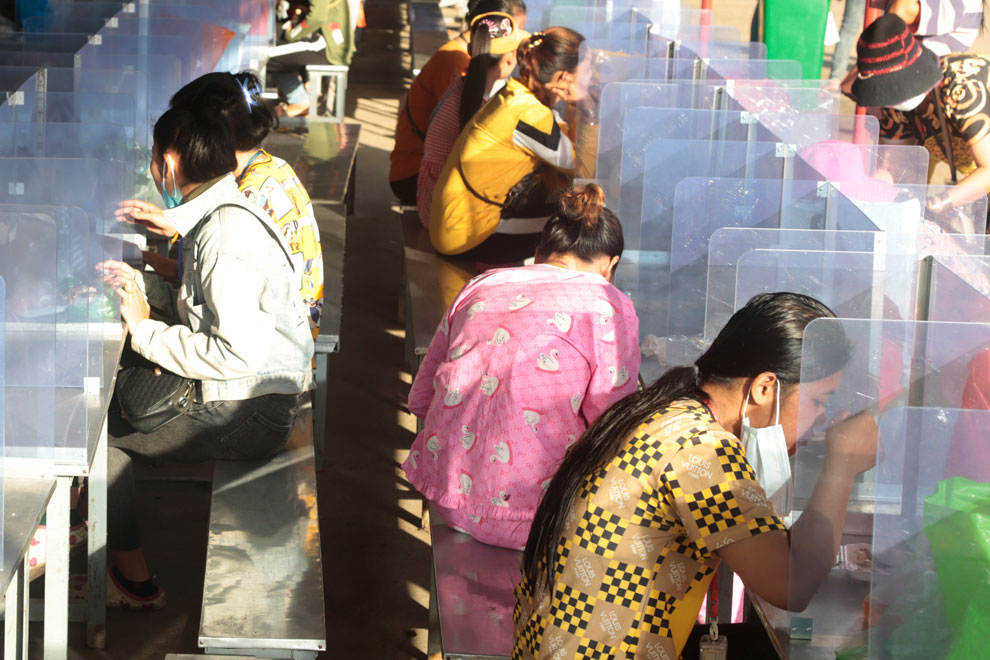
Garment workers have breakfast before starting work at their factory in Kakab II commune of Phnom Penh’s Por Sen Chey district on July 14. Heng Chivoan
Seventeen union representatives from the Wage Negotiation Working Group have agreed to negotiate for a $22.20 increase in salaries for textile, garment and footwear workers for 2022.
The decision was made after the representatives, who represent trade unions nationwide, convened an internal consultation meeting both in-person and online on September 6 to jointly determine an amount for negotiations with employers.
Collective Union of Movement of Workers president Pav Sina, who attended the meeting, told The Post on September 6 that after discussions, unions agreed to jointly request an 11.6 per cent increase, or $22.20, in workers’ wages for 2022.
Sina added the proposed increase would amount to about $214.20 per month for workers’ wages in 2022.
However, Sina claimed that this figure was only a proposed figure by the union, with the actual decision depending on further tripartite negotiations.
“We will use this figure for negotiations or perhaps bargaining. This is not a set figure, it comes under our study of seven criteria,” he said.
According to Sina, the first tripartite meeting will be held on September 7, which will be attended by representatives from the Ministry of Labour and Vocational Training, union representatives and employers. He expects negotiations to raise workers’ wages would achieve a better outcome than last year.
“We see now that workers’ benefits are being lost. So if a wage increase is small and they keep losing benefits, it means that workers suffer again. I think our proposal is a response to workers’ losses in the past which may continue in the future,” he said.
This year, the government increased the minimum wage for textile, garment and footwear workers from $190 to $192 per month.
The government said the $2 increase was given because this sector was suffering from a severe crisis caused by Covid-19.
Labour ministry spokesman Heng Sour told The Post on September 6 that the ministry did not take a stand either way regarding the determination of wages prior to the meeting.
Sour added that when negotiating an increase in the minimum wage for workers in the textile, garment and footwear sector, the ministry has the role of coordinating and providing figures and answers to questions from each party.
“Wage negotiations require technical, statistical and economic knowledge and an understanding of the purpose of job retention and job creation,” he said.
Garment Manufacturers Association in Cambodia deputy secretary-general Kaing Monika said it was an annual wage review meeting.
He said the review did not necessarily mean an increase in wages. The review can be upward or downward depending on the socio-economic situation under which there are seven criteria to be seriously considered.
“A demand for an increase of more than 11 per cent during this global crisis is absolutely not appropriate. It’s economically wrong and definitely scares off existing investors and potential investors,” he said.
He also mentioned that there were other high costs which employers had to absorb to operate during this critical time. Therefore, he hoped the union would be more reasonable in their final demands.
The National Council on Minimum Wage (NCMW) sets July every year for a consultation meeting on the minimum wage internally for each party, and August for bilateral and tripartite consultation meetings.
In September, the NCMW will conduct a consultation meeting to decide on workers’ wages in the textile, garment and footwear industries for next year.












